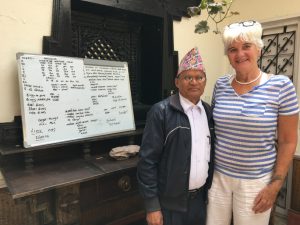Embark on a journey through Barcelona's captivating art and architecture. Explore the visionary works of Gaudí, Picasso, and more, set against the city's stunning landscapes.
GVI
Posted: July 5, 2024

Posted: March 29, 2019
“Namaste Chet Ji” is the greeting given to our Nepalese language teacher. He is of small stature as are most of the people of this mountain nation, but not small in personality. His wire framed glasses hide his slightly squint eye, but not the twinkle that comes to the fore when he throws his head back and laughs at out attempt to master the tonal sounds of his home tongue. On enquiring why he always wears a typical Nepalese style hat, thinking that there may be some meaningful significance, he smiles and says he is going bald and it is to protect him from sun burn and keep his head warm.
As a teacher, a guru, he is part of the Brahmin, the highest caste and by adding ‘Ji’ to the end of his name is a sign of respect. This respectfulness is carried through the Nepalese language with different connotation attached to a lot of their sentences. For example, if referring to you, it is either “tau” for animals and things, “timi” for friends, family members and wives and the very respectful “topaai” the highest form of greeting which can never be used for a wife.
As a wife, your marriage will have been arranged and you would then immediately join the husbands family. It is not correct “thik chhna” for a man and woman to shake hands nor for couples to hold hands in public. Segregation is a natural way of life in this Hindu country and men can be quite arrogant when being forcibly exposed to the openness of western culture. This explains a lot about the behaviour of an Indian gentleman, who found himself sitting between two South African women on a flight between Goa and Mumbai. To us he was downright rude, arrogant and inconsiderate, but maybe the poor man just did not know how to conduct himself in such a situation.
Chet Ji explained how the saying of thank you is not a common practice in Nepal, and it is only the westerners who feel the need to continually thank. To the Nepalese, it isn’t necessary and goes without saying. He has been teaching for 25 years and is very appreciative of being offered the job of teaching the GVI volunteers visiting his country.
He explains how the caste system, which has been banned, is still very active amongst the citizens.The highest caste are the Brahmins, who are the teachers. Second are the Chhetri’s the warrior and royal family members. Then Baise, and finally Sudra, the lowest caste colloquially known as the “untouchables”. According to Chet – Castes 1 to 3 have inbred moral values, whereas the Sudra’s, through eras of conditioning have few and no matter how hard they might try, they can never aspire to climb the invisible ladder. Government is corrupt and nepotism abounds (by the sounds of it this is now a worldwide phenomena). Chet poses us a question with that twinkle in his eye, “Tepai lai kasta Trump chha?” “What do you think of Trump?” Our immediate response “Noraamro” – our Nepalese is getting pretty good. “He is not good” He laughs and agrees.
At the end of the lesson I build up the courage to ask “Linus photo Chet Ji?” with all the correct tonal depths. Because we have learnt one word in a slightly different tone has 2 opposite meanings. When in a restaurant and you ask for daal, make sure you say it without any aspirations. Because daal is not only a form of curry, but also a condom!

Embark on a journey through Barcelona's captivating art and architecture. Explore the visionary works of Gaudí, Picasso, and more, set against the city's stunning landscapes.
GVI
Posted: July 5, 2024